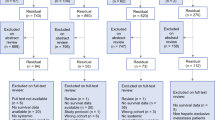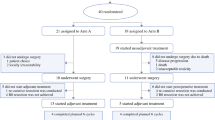Abstract
Background and purpose
The clinical role of postoperative adjuvant therapy in hepatocellular carcinoma (HCC) is still unclear. The purpose of our study was to explore the clinical value of postoperative adjuvant anti-programed cell death 1 antibody (PA-PD-1) on the prognosis of HCC patients with high relapse risks after surgery.
Patients and methods
Data of consecutive HCC patients with high recurrence risks treated with liver resection at our center during January 2019 and March 2021 were prospectively collected. Baseline differences were balanced between HCC patients with (PA-PD-1 group) or without PA-PD-1 (non-PD-1 group) after hepatectomy by propensity-score matching (PSM). Between these two groups, we compared overall survival (OS) and recurrence-free survival (RFS). Independent prognostic risk factors for OS and RFS were confirmed by Cox regression analysis, and subgroup analysis was also performed.
Results
47 pairs of patients with or without PD-1 treatment after hepatectomy were matched. After PSM, the 1-year and 2-year RFS was 58.4% and 44.1% in the PA-PD-1 group, and 34.0% and 21.3% in the non-PD-1 group (p = 0.008). The OS at 1 year and 2 years was 91.2% and 91.2% in the PA-PD-1 group, compared with 85.1% and 61.7% in the non-PD-1 group (p = 0.024). Multivariable analyses demonstrated that PA-PD-1 was an independent protective predictor associated with RFS and OS. Through subgroup analysis, we concluded that HCC patients with portal venous tumor thrombus (PVTT) or tumor size ≥ 5 cm significantly benefited from PA-PD-1 therapy in RFS and OS.
Conclusions
Adjuvant anti-PD-1 antibody can effectively improve the survival outcomes of HCC patients with high relapse risks after hepatectomy in this prospective observational study. This finding should be confirmed by results of the ongoing phase 3 randomized controlled trials.



Similar content being viewed by others
Data availability
The data used in the study are available from the corresponding author upon reasonable request.
Abbreviations
- AFP:
-
Alpha-fetoprotein
- CIs:
-
Confidence intervals
- HCC:
-
Hepatocellular carcinoma
- HRs:
-
Hazard ratios
- HVTT:
-
Hepatic venous tumor thrombus
- MVI:
-
Microvascular invasion
- RFS:
-
Recurrence-free survival
- TACE:
-
Transarterial chemoembolization
- OS:
-
Overall survival
- PA-PD-1:
-
Postoperative adjuvant anti-programed cell death 1 antibody
- PSM:
-
Propensity-score matching
- PVTT:
-
Portal venous tumor thrombus
References
Sung H, Ferlay J, Siegel RL, Laversanne M, Soerjomataram I, et al. Global Cancer Statistics 2020: GLOBOCAN Estimates of Incidence and Mortality Worldwide for 36 Cancers in 185 Countries. CA Cancer J Clin. 2021;71:209–249
Poon RT, Fan ST, Lo CM, Liu CL, Wong J. Long-term survival and pattern of recurrence after resection of small hepatocellular carcinoma in patients with preserved liver function: implications for a strategy of salvage transplantation. Ann Surg. 2002;235:373–382
Lee SY, Konstantinidis IT, Eaton AA, Gönen M, Kingham TP, et al. Predicting recurrence patterns after resection of hepatocellular cancer. HPB (Oxford). 2014;16:943–953
Tabrizian P, Jibara G, Shrager B, Schwartz M, Roayaie S. Recurrence of hepatocellular cancer after resection: patterns, treatments, and prognosis. Ann Surg. 2015;261:947–955
Lang H, Sotiropoulos GC, Brokalaki EI, Schmitz KJ, Bertona C, et al. Survival and recurrence rates after resection for hepatocellular carcinoma in noncirrhotic livers. J Am Coll Surg. 2007;205:27–36
Altekruse SF, McGlynn KA, Dickie LA, Kleiner DE. Hepatocellular carcinoma confirmation, treatment, and survival in surveillance, epidemiology, and end results registries, 1992–2008. Hepatology. 2012;55:476–482
Lee JG, Kang CM, Park JS, Kim KS, Yoon DS, et al. The actual five-year survival rate of hepatocellular carcinoma patients after curative resection. Yonsei Med J. 2006;47:105–112
Shinkawa H, Tanaka S, Takemura S, Amano R, Kimura K, et al. Nomograms predicting extra- and early intrahepatic recurrence after hepatic resection of hepatocellular carcinoma. Surgery. 2021;169:922–928
Tung-Ping Poon R, Fan ST, Wong J. Risk factors, prevention, and management of postoperative recurrence after resection of hepatocellular carcinoma. Ann Surg. 2000;232:10–24
Xu XF, Xing H, Han J, Li ZL, Lau WY, et al. Risk factors, patterns, and outcomes of late recurrence after liver resection for hepatocellular carcinoma: a multicenter study from China. JAMA Surg. 2019;154:209–217
Amini N, Ejaz A, Spolverato G, Maithel SK, Kim Y, Pawlik TM. Management of lymph nodes during resection of hepatocellular carcinoma and intrahepatic cholangiocarcinoma: a systematic review. J Gastrointest Surg. 2014;18:2136–2148
Chen ZH, Zhang XP, Feng S, Feng JK, Chai ZT, et al. Liver resection versus intensity-modulated radiation therapy for treatment of hepatocellular carcinoma with hepatic vein tumor thrombus: a propensity score matching analysis. Hepatobiliary Surg Nutr. 2021;10:646–660
Kokudo T, Hasegawa K, Matsuyama Y, Takayama T, Izumi N, et al. Survival benefit of liver resection for hepatocellular carcinoma associated with portal vein invasion. J Hepatol. 2016;65:938–943
Heimbach JK, Kulik LM, Finn RS, Sirlin CB, Abecassis MM, et al. 2018. AASLD guidelines for the treatment of hepatocellular carcinoma. Hepatology (Baltimore, Md.) 67:358–80
European Association for the Study of the Liver. Electronic address eee, European Association for the Study of the L. 2018. EASL Clinical Practice Guidelines: Management of hepatocellular carcinoma. J Hepatol 69:182-236
Lo CM, Liu CL, Chan SC, Lam CM, Poon RT, et al. A randomized, controlled trial of postoperative adjuvant interferon therapy after resection of hepatocellular carcinoma. Ann Surg. 2007;245:831–842
Wang Z, Ren Z, Chen Y, Hu J, Yang G, et al. Adjuvant transarterial chemoembolization for hbv-related hepatocellular carcinoma after resection: a randomized controlled study. Clin Cancer Res. 2018;24:2074–2081
Wei W, Jian PE, Li SH, Guo ZX, Zhang YF, et al. Adjuvant transcatheter arterial chemoembolization after curative resection for hepatocellular carcinoma patients with solitary tumor and microvascular invasion: a randomized clinical trial of efficacy and safety. Cancer Commun (Lond Engl). 2018;38:61
Yin J, Li N, Han Y, Xue J, Deng Y, et al. Effect of antiviral treatment with nucleotide/nucleoside analogs on postoperative prognosis of hepatitis B virus-related hepatocellular carcinoma: a two-stage longitudinal clinical study. J Clin Oncol. 2013;31:3647–3655
Hui D, Qiang L, Jian W, Ti Z, Da-Lu K. A randomized, controlled trial of postoperative adjuvant cytokine-induced killer cells immunotherapy after radical resection of hepatocellular carcinoma. Dig Liver Dis. 2009;41:36–41
Lee JH, Lee JH, Lim YS, Yeon JE, Song TJ, et al. Adjuvant immunotherapy with autologous cytokine-induced killer cells for hepatocellular carcinoma. Gastroenterology. 2015;148:1383–91.e6
Takayama T, Sekine T, Makuuchi M, Yamasaki S, Kosuge T, et al. Adoptive immunotherapy to lower postsurgical recurrence rates of hepatocellular carcinoma: a randomised trial. Lancet. 2000;356:802–807
El-Khoueiry AB, Sangro B, Yau T, Crocenzi TS, Kudo M, et al. Nivolumab in patients with advanced hepatocellular carcinoma (CheckMate 040): an open-label, non-comparative, phase 1/2 dose escalation and expansion trial. Lancet. 2017;389:2492–2502
Zhu AX, Finn RS, Edeline J, Cattan S, Ogasawara S, et al. Pembrolizumab in patients with advanced hepatocellular carcinoma previously treated with sorafenib (KEYNOTE-224): a non-randomised, open-label phase 2 trial. Lancet Oncol. 2018;19:940–952
Qin S, Ren Z, Meng Z, Chen Z, Chai X, et al. Camrelizumab in patients with previously treated advanced hepatocellular carcinoma: a multicentre, open-label, parallel-group, randomised, phase 2 trial. Lancet Oncol. 2020;21:571–580
Ribas A, Wolchok JD. Cancer immunotherapy using checkpoint blockade. Science. 2018;359:1350–1355
Imamura H, Matsuyama Y, Tanaka E, Ohkubo T, Hasegawa K, et al. Risk factors contributing to early and late phase intrahepatic recurrence of hepatocellular carcinoma after hepatectomy. J Hepatol. 2003;38:200–207
2018. EASL Clinical Practice Guidelines: Management of hepatocellular carcinoma. J Hepatol 69:182–236
Luke JJ, Rutkowski P, Queirolo P, Del Vecchio M, Mackiewicz J, et al. Pembrolizumab versus placebo as adjuvant therapy in completely resected stage IIB or IIC melanoma (KEYNOTE-716): a randomised, double-blind, phase 3 trial. Lancet. 2022;399:1718–1729
Choueiri TK, Tomczak P, Park SH, Venugopal B, Ferguson T, et al. Adjuvant pembrolizumab after nephrectomy in renal-cell carcinoma. N Engl J Med. 2021;385:683–694
Kudo M, Ueshima K, Nakahira S, Nishida N, Ida H, et al. 2021. Adjuvant nivolumab for hepatocellular carcinoma (HCC) after surgical resection (SR) or radiofrequency ablation (RFA) (NIVOLVE): A phase 2 prospective multicenter single-arm trial and exploratory biomarker analysis. Journal of Clinical Oncology 39:4070-
Bruix J, Sherman M. Management of hepatocellular carcinoma: an update. Hepatology. 2011;53:1020–1022
Poon RT, Fan ST, Ng IO, Wong J. Significance of resection margin in hepatectomy for hepatocellular carcinoma: a critical reappraisal. Ann Surg. 2000;231:544–551
Zhu XD, Li KS, Sun HC. Adjuvant therapies after curative treatments for hepatocellular carcinoma: current status and prospects. Genes Dis. 2020;7:359–369
Shimoda M, Tago K, Shiraki T, Mori S, Kato M, et al. Risk factors for early recurrence of single lesion hepatocellular carcinoma after curative resection. World J Surg. 2016;40:2466–2471
Lee HY, Rhim H, Lee MW, Kim YS, Choi D, et al. Early diffuse recurrence of hepatocellular carcinoma after percutaneous radiofrequency ablation: analysis of risk factors. Eur Radiol. 2013;23:190–197
Huang L, Li J, Yan J, Cao J, Liu C, et al. Early recurrence after curative resection in oligonodular hepatocellular carcinoma. Hepatogastroenterology. 2013;60:28–31
Zhou J, Sun H, Wang Z, Cong W, Wang J, et al. 2020. Guidelines for the Diagnosis and Treatment of Hepatocellular Carcinoma (2019 Edition). Liver cancer 9:682–720
Cheng S, Chen M, Cai J, Sun J, Guo R, et al. 2020. Chinese Expert Consensus on Multidisciplinary Diagnosis and Treatment of Hepatocellular Carcinoma with Portal Vein Tumor Thrombus (2018 Edition). Liver cancer 9:28–40
Sun J, Guo R, Bi X, Wu M, Tang Z, et al. 2022. Guidelines for Diagnosis and Treatment of Hepatocellular Carcinoma with Portal Vein Tumor Thrombus in China (2021 Edition). Liver cancer 11:315–28
Acknowledgements
Not applicable.
Funding
This study was supported by the National Natural Science Foundation of China (No. 82072029), the National high level talents special support plan—“Ten thousand plan”–Young top-notch talent support program (No. 2019).
Author information
Authors and Affiliations
Contributions
ZW Peng, SL Shen, and J Wu conceived and designed this study; material acquisition, data collection, analysis, and interpretation were carried out by W Chen, SF Hu, ZL Liu, YK Sun, and ZW Peng. The initial draft of the article was written by W Chen, SF Hu, ZL Liu, and YK Sun. And ZW Peng revised it. Final approval of the manuscript was obtained from all authors.
Corresponding authors
Ethics declarations
Conflict of interest
Wei Chen, Shuifang Hu, Zelong Liu, Yukun Sun, Jian Wu, Shunli Shen, and Zhenwei Peng declare that they do not have any conflict of interests.
Informed consent in studies with human subjects
All enrolled participants provided written informed consent for data collection and analysis.
Ethical approval
The study was conducted under the guidance of the Declaration of Helsinki (1964) and was approved by the institutional research ethics committee of the First Affiliated Hospital of Sun Yat-sen University.
Additional information
Publisher's Note
Springer Nature remains neutral with regard to jurisdictional claims in published maps and institutional affiliations.
Supplementary Information
Below is the link to the electronic supplementary material.
Rights and permissions
Springer Nature or its licensor (e.g. a society or other partner) holds exclusive rights to this article under a publishing agreement with the author(s) or other rightsholder(s); author self-archiving of the accepted manuscript version of this article is solely governed by the terms of such publishing agreement and applicable law.
About this article
Cite this article
Chen, W., Hu, S., Liu, Z. et al. Adjuvant anti-PD-1 antibody for hepatocellular carcinoma with high recurrence risks after hepatectomy. Hepatol Int 17, 406–416 (2023). https://doi.org/10.1007/s12072-022-10478-6
Received:
Accepted:
Published:
Issue Date:
DOI: https://doi.org/10.1007/s12072-022-10478-6




